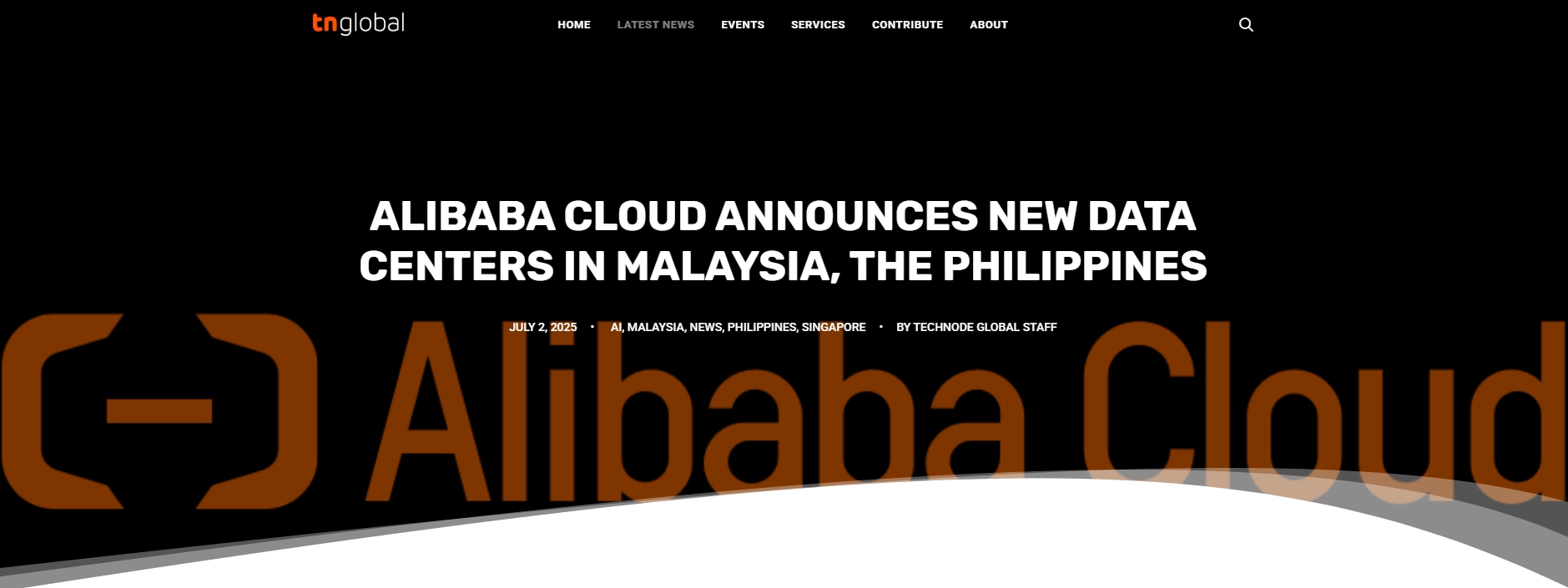To meet the growing demand for cloud and artificial intelligence (AI) services across Southeast Asia, AlibabaCloud has announced the launch of its third data center in Malaysia on July 1, 2025.
The firm said in a statement on Wednesday that it also plans to open its second data center in the Philippines in October 2025.
The expansions build on earlier infrastructure investments in Thailand, Mexico, and South Korea, announced in the first half of 2025.
This growing network ensures that Alibaba Cloud can meet the rising global demand for secure, resilient and scalable cloud services, empowering businesses, developers, and organizations to innovate and scale with confidence as AI adoption accelerates across industries.
Alibaba Cloud has also launched its first AI Global Competency Center (AIGCC) in Singapore.
The move aims to accelerate AI adoption by supporting enterprises of all sizes, from small and medium enterprises (SMEs) to large-scale organizations, while also addressing the growing global demand for AI talent.
The center is designed to support over 5,000 businesses and 100,000 developers, offering access to advanced AI models and powerful computing resources to accelerate experimentation and deployment.
Developers and businesses will benefit from the AI Innovation Lab, which offers token credits, curated datasets and personalized support tailored to real-world scenarios and industry needs.
As a collaborative innovation hub, the AIGCC aims to bring together more than 1,000 companies and startups to co-develop next-generation AI solutions, fostering an ecosystem of applied innovation.
The center will also introduce over 10 AI agents across key industries – including finance, healthcare, logistics, manufacturing, retail and energy – demonstrating AI’s potential across different verticals.
To build a robust AI talent pipeline, Alibaba Cloud will partner with more than 120 universities and institutions globally, with the goal of training 100,000 AI professionals annually.
“Over the past decade, Singapore has been both an innovation center and a gateway to the region’s digital economy,
“As we celebrate this important milestone, we reaffirm our commitment to empowering businesses of all sizes and verticals while advancing cutting- edge AI innovations and driving sustainable digital transformation in Singapore for years to come,” said Selina Yuan, President of International Business at Alibaba Cloud Intelligence.
“Together with our partners and customers, we look forward to shaping Singapore’s future as a global leader in AI and cloud innovation,” she added.
Alibaba Cloud has also announced new offerings to international customers by upgrading Infrastructure as a Service (IaaS) and Platform as a Service (PaaS) products and introducing new AI tools.
Alibaba Cloud Data Transmission Service (DTS), a real-time data streaming service, introduced a new “One Channel For AI” capability to streamline multimodal data preparation.
Meanwhile, Alibaba Cloud’s Platform for AI (PAI) has enhanced its high-performance AI inference capabilities to better support complex models like Mixture of Experts (MoE) and large-scale deployments with two key improvements in its PAI-Elastic Algorithm Service (EAS).
In response to customer demand, the company also revealed that its 9th Generation intel-based Enterprise Elastic Compute Service (ECS) instance will be available across additional global markets from July, including Japan, South Korea, Thailand, Malaysia, the Philippines, the United Arab Emirates, Germany and the United Kingdom.
Alibaba Cloud’s sustainability platform, Energy Expert, on the other hand, introduced a cutting-edge AI-driven ESG Reporting solution, empowering organizations to navigate the complexities of environmental, social, and governance (ESG) disclosures with precision and ease.
The firm has also revealed a study that is conducted by Forrester Consulting and commissioned by Alibaba in collaboration with Alibaba-NTU Global e-Sustainability CorpLab (ANGEL).
The study showed the growing recognition of the importance of green AI, but highlighted a significant gap between vision and execution.
The study found that while 84 percent of leaders who have implemented an AI sustainability vision consider green AI to be important, 69 percent of organizations globally are still at the beginner stage of AI adoption.
Many cited persistent technical challenges as key barriers to progress – among them, the lack of sustainably sourced materials for AI hardware (80 percent) and the difficulty of optimizing data center energy usage (73 percent).
Beyond the technical hurdles, the survey also revealed widespread capability gaps.
A significant number of decision-makers indicated they lacked the knowledge to define a clear green AI strategy (74 percent), as well as the skills needed to implement and operate it (76 percent).
Considering those challenges, the study recommends several key strategies to drive wider adoption of Green AI, including powering data centers with renewable energy, deploying edge computing with optimized smaller models to reduce data center loads, and developing applications with code that requires less computational power.
It also highlights the importance of increased collaboration between public and private sectors on regulation and standards and leveraging open-source models to minimize pre-training and energy consumption.
Established in 2009, Alibaba Cloud is the digital technology and intelligence backbone of Alibaba Group.
It offers a complete suite of cloud services to customers worldwide, including elastic computing, database, storage, network virtualization services, large-scale computing, security, big data analytics, machine learning and AI services.








